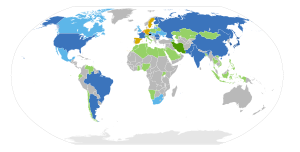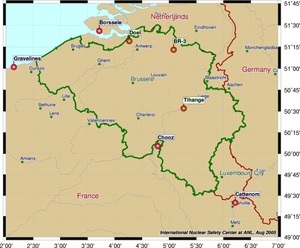- Nuclear energy in Belgium
-
In 1962, Belgium received its first nuclear reactor – an 11 MWe pressurized water reactor — from the United States. The country’s first commercial nuclear reactor began operating in 1974. Currently, Belgium has seven nuclear reactors operating in the country with a net MWe of 5,761. Electricity consumption in Belgium has increased slowly since 1990 and nuclear energy provides 54%, 45 billion kWh per year, of the country’s energy.[1]
Sites
There are two commercial power plants operational:
- Doel Nuclear Power Station along the Scheldt river, near the port of Antwerp
- Tihange Nuclear Power Station along the Meuse river
Besides those two, there is a test reactor at the SCK•CEN site in Mol, which is used for research.
Waste
A national agency is responsible for radioactive waste management, including transport, treatment, conditioning, storage, and disposal. The main disposal facility is the SCK•CEN site close to the towns Mol and Dessel, which stores short-lived intermediate-level waste and high-level waste. Several shipments of reprocessed Belgian spent fuel, from France, have also arrived at the Mol-Dessel site.[1]
Government policy
In the year 2000, a government appointed commission reported that nuclear energy was important to Belgium and recommended further development. However, in 2003 Belgium's Government, then a coalition which included the Green party Groen!, passed legislation which stipulated that no new reactors would be built and that Belgium's seven reactors would close between 2015–2025.[2][3] When the law was being passed, there was speculation it would be overturned again as soon as an administration without Groen! was in power.[citation needed] A report published in 2005 by the Federal Planning Bureau noted that in many parts of Belgium nuclear power makes up more than 50% of the electricity generated.[4] It would therefore be difficult for Belgium to adhere to the emissions targets of the Kyoto Protocols without nuclear power.[5] In 2007, the Belgian Commission on Energy said that the use of nuclear energy is imperative to meet CO2 requirements and maintain economic stability. Furthermore, the commission believed that energy prices would double without the use of nuclear energy. The commission finally recommended that the operating lives of the seven nuclear reactors should be extended.[1] In 2009, the government decided to extend the lifetimes of the three oldest reactors until 2025. In exchange, the owners will be charged an extra €215–245 million (about US$340 million) per year.[6] However this was not yet finalized into law when in 2010 the government resigned over unrelated issues. [7] This was considered to be a formality, that would be taken care of when a new government was formed. However a prolonged period of political instability without a government being formed followed. This continued until in March 2011 the Fukushima I nuclear accidents happened. At which time the caretaker government decided to postpone any debate or decision in the matter until after the results of an European stress-test of the facilities are known.[8]
See also
- Energy in Belgium
- Wind power in Belgium
- Electricity sector in Belgium
References
- ^ a b c "Nuclear Power in Belgium". Country Briefings. World Nuclear Association. October 2009. http://www.world-nuclear.org/info/inf94.html. Retrieved 2009-10-17.
- ^ "Status of nuclear in current member states. Belgium". World Information Service on Energy. 2003-11-14. http://www10.antenna.nl/wise/596-8/h3.php. Retrieved 2007-07-13.
- ^ M. V. Ramana (2003-01-30). "Op-ed: Phasing out nuclear power in Europe". Daily Times. http://www.dailytimes.com.pk/default.asp?page=story_30-1-2003_pg3_2. Retrieved 2007-07-14.
- ^ Henry, Alain (July 12, 2005) (in French), Quelle énergie pour un développement durable ?, Working Paper 14-05, Federal Planning Bureau, http://www.plan.be/publications/publication_det.php?lang=fr&TM=30&IS=63&KeyPub=198. The breakdown of electricity generation methods is given in Figure 7 on page 13.
- ^ "Addicted to nuclear energy?". Expatica. 2005-07-14. http://www.expatica.com/be/news/local_news/addicted-to-nuclear-energy-21976.html. Retrieved 2007-07-13.
- ^ "Belgium delays nuclear phase-out until 2025: minister". Agence France-Presse (AFP). 12 October 2009. http://news.yahoo.com/s/afp/20091012/wl_afp/belgiumenergynuclearpolitics. Retrieved 2009-10-17.[dead link]
- ^ "Nuclear Power plants to close sooner due to the fall of the government" (in nl). De Morgen. 2010-05-04. http://www.demorgen.be/dm/nl/6779/Kernenergie/article/detail/1101338/2010/05/04/Kerncentrales-toch-sneller-dicht-door-val-van-regering.dhtml.
- ^ "Stress tests for Belgian nuclear plants" (in en). vrt. 2011-03-16. http://www.deredactie.be/permalink/1.982847.
Nuclear power by country GWe > 10 Canada · China · EU (France · Germany · United Kingdom) · Japan · Russia · South Korea · Ukraine · United States
GWe > 2 EU (Belgium · Czech Republic · Finland · Spain · Sweden) · India · Republic of China (Taiwan) · SwitzerlandGWe > 1 GWe < 1 Planned Phasing-out Opposed List of nuclear power stations · Nuclear energy policy · Nuclear energy policy by country · Nuclear technology portal Categories:
Wikimedia Foundation. 2010.


